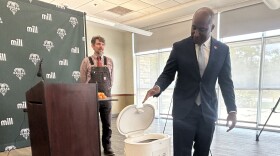-
In a new partnership with a company that provides high-tech garbage cans that turn food into compost, Kansas City will compost hundreds of thousands of tons of food waste for use on gardens and to grow food. Kansas Citians can now bring their food scraps to one of 50 bins around the city.
-
In bestselling author Michael Grunwald's new book "We Are Eating The Earth," he highlights how agriculture is dramatically contributing to climate change. He's speaking next week at the Kansas City Public Library.
-
Harvesters, the food bank that serves the Kansas City area and helps supply food to local pantries and shelters, says that thousands of cases of canned food, eggs, milk and more were called off by President Trump's U.S. Department of Agriculture.
-
Kansas City nonprofits need to feed more hungry people with less funding. Here's what they're tryingKansas City community kitchens are seeing higher demand as food prices remain high and COVID-19 assistance disappears. The food bank Harvesters is focusing on rescuing food waste as one way to shore up its supplies as demand rises, and donations are down.
-
The legislation requiring companies to build their meatpacking sludge storage lagoons away from nearby homes passed the Missouri Senate this week.
-
Kids Feeding Kids, a program run by Pete's Garden, teaches high schooler students how to mass produce meals to serve families in their communities.
-
The practice of preserving food via canning has been around for two centuries, but has experienced a revival in interest. Here’s how two Kansas Citians are keeping the practice alive in two very different ways.
-
The annual event runs from Jan. 12-21. Over 200 participating restaurants have created special multi-course menus, with 10% of proceeds going to local nonprofit Kanbe’s Markets. But restaurants are reminding diners to give them some grace during one of their busiest times of the year.
-
Kansas City’s Genesis School taught at-risk students for years, then it nearly lost its charter. The near-miss raised larger questions about what success and accountability looks like in Missouri. Plus: a USDA program gives a second chance to food that stores won’t sell — but is perfectly good to eat.
-
Over 100 billion pounds of food goes to waste every year in America. The U.S. Department of Agriculture’s Farm to Food Bank is trying to cut down on that waste by connecting local farmers and food pantries, but its future depends on how much funding is included for the program in the next farm bill.
Play Live Radio
Next Up:
0:00
0:00
Available On Air Stations










